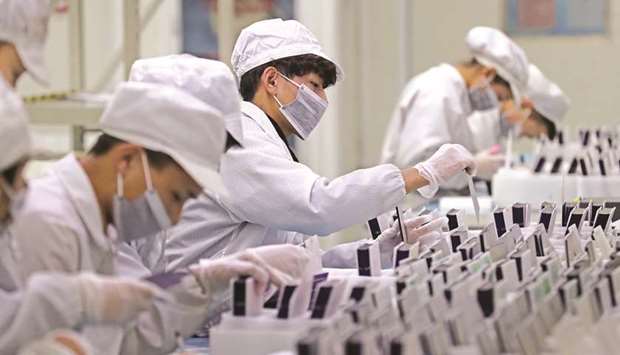China’s factory-gate inflation slowed for a seventh straight month in January to its weakest pace since September 2016, raising concerns the world’s second-biggest economy may see the return of deflation as domestic demand cools.
Consumer inflation, meanwhile, eased in January from December to a 12-month low due to slower gains in food prices, official data showed yesterday, despite the Lunar New Year holiday, which typically pushes up demand for food.
China’s producer price index (PPI) in January rose a meagre 0.1% from a year earlier, data from the National Bureau of Statistics (NBS) showed, a sharp slowdown from the previous month’s 0.9% increase.
Analysts polled by Reuters had expected producer inflation would slow to 0.2%.
While tame inflation gives authorities the flexibility to ease monetary policy to shore up economic growth, deflationary risks could further hurt corporate profitability.
On a monthly basis, producer prices have already been falling over the past three months.
In December, PPI fell 0.6%, moderating from a 1% decrease in December.
“It is too early to say China has entered the deflationary environment, but the risks definitely have heightened,” said Raymond Yeung, chief economist of Greater China at ANZ, adding that profitability of upstream industries will come under pressure.
Earnings at China’s industrial firms shrank for a second straight month in December, putting pressure on policymakers to support industries hurt by slowing prices and weak factory activity.
Data showed prices for raw materials fell in January for the first time in over two years, swinging from a 0.8% rise in December. Price rises in the production sector also turned negative.
Recent factory surveys show weakening domestic orders and shrinking business activity, with both official and private sector reports pointing to growing strains in China’s manufacturing sector, a key source of growth and jobs.
Domestic demand for industrial goods and services has eased in recent months as the government’s multi-year campaign to curb corporate debt and risky lending practices crimps capital spending and corporate investment.
“With factory-gate deflation likely to deepen in the coming months, we expect policymakers to roll out further measures to ease financial pressure on industrial firms, including cuts to benchmark lending rates,” said Julian Evans-Pritchard, senior China economist at Capital Economics.
The CPI rose 1.7% in January from a year earlier, slower than the 1.9% increase in December, and below expectations of a 1.9% gain.
On a month-on-month basis, the CPI rose 0.5%.
The food price index in January rose 1.9% from a year earlier, down from December’s reading of 2.5%, data showed yesterday.
The moderation in food prices breaks the historic pattern of acceleration that typically precedes the week-long Lunar New Year, which came in the first week of February this year.
While the slowdown was due in part to a decline in pork prices as the effects of African Swine Fever on the industry receded, the broader impact on prices pressures remains a concern.
The core consumer price index, which strips out volatile food and energy prices, rose 1.9% year-on-year, accelerating from 1.8% gain in December.

Workers are seen at a production line manufacturing solar photovoltaic components at a factory in Huzhou, Zhejiang province. China’s producer price index in January rose a meagre 0.1% from a year earlier, data from the National Bureau of Statistics showed yesterday.
